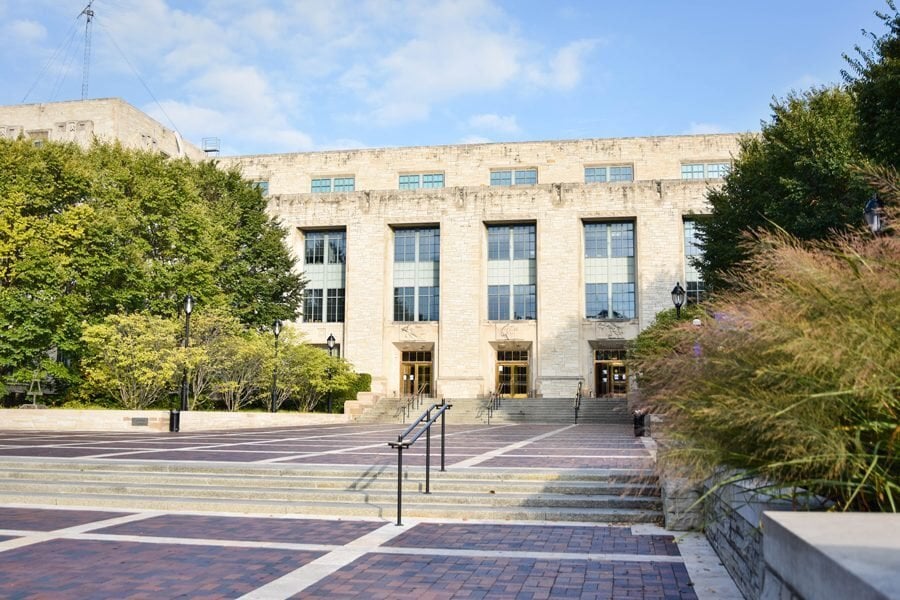Materials science Prof. Jeff Snyder petitions arrest of MIT colleague
Technological Institute, 2145 Sheridan Road. Northwestern materials science Prof. Jeff Snyder recently launched a petition challenging charges against MIT Prof. Gang Chen.
February 8, 2021
McCormick Prof. Jeff Snyder recently launched a petition challenging the charges against Massachusetts Institute of Technology Prof. Gang Chen, who was arrested in January on allegations of grant fraud and collusion with China.
In the Jan. 30 petition, Snyder called on the U.S. government to reaffirm the National Policy on the Transfer of Scientific, Technical and Engineering Information (NSDD-189). The policy, which was reaffirmed in 2001 and 2010, states that federal research should be unrestricted “to the maximum extent possible.”
“I’m getting more communications from people outside the immediate professors and communities involved with Gang Chen,” Snyder said. “A broader community of people who are very surprised to hear that this is what this is what our government is doing to us citizens.”
According to Snyder, Chen was arrested for routine activities expected of a professor, such as writing recommendation letters for international students and collaborating with foreign universities. Snyder said he has worked with Chen, who gave colloquiums at NU in 2003 and 2020. Since going live, Snyder’s petition has accumulated over 600 signatures.
Following Chen’s arrest, MIT faculty released a letter on Jan. 21 with over 170 signatures, countering the allegations against Chen. The letter asserts the allegation that Chen “knowingly and willfully defrauded (the Taxpayers) out of $19 million in federal grants” is “broad and unqualified.”
The $19 million grant was given to MIT and not directly to any individual, according to a letter from the MIT President. Despite this, Chen was charged with wire fraud, a federal felony that Snyder said is typically associated with organized crime and directly deceiving the government.
According to MIT faculty’s letter, Chen could not have committed wire fraud because all his collaborations with Chinese institutions “are anything but hidden from the eyes of the public, let alone the sophisticated grant reviewers at the (Department of Energy).”
The letter also makes reference to Chen’s publicly available CV and his routine disclosures of funding on public databases at every step of the grant process.
Snyder said even if Chen did make mistakes in disclosure when filing a grant application, he should be charged with scientific misconduct similar to plagiarism, not a federal felony. He added that this one case is part of a broader pattern of targeting academics who collaborate with China, which will harm U.S. interests in the long run.
In 2015, the Federal Bureau of Investigation dropped charges on Xiaoxing Xi, a Temple University Professor who was arrested on similar allegations of collusion with China. A 2017 New York Times article said “prosecutors ultimately presented no evidence of espionage” and labelled the conduct an “embarrassing acknowledgement” that the FBI misunderstood the research they accused him of sending to China.
“It makes (American professors) question whether we should write that next paper with our Chinese collaborators, whether we should visit an institution that has a Chinese scientist, whether we should go overseas at all,” Snyder said.
In addition to impacting the morale of domestic professors, Snyder said it also affects the U.S.’s ability to attract and retain foreign talent, which is a major part of how the U.S. became a leader in new technologies in the first place.
He said NU’s graduate Materials Science and Engineering department, which typically sees an equal number of domestic and Chinese applicants, had a 40 percent drop in applications from China last year. He attributed this drop to the U.S. curtailing visas for Chinese international students, which he said discouraged new graduate students from applying.
“This competition we have with China is actually driving (the U.S.) back,” Snyder said.
Correction: A previous version of this article misstated which department reviewed Chen’s grants. It has been updated to reflect it is the Department of Energy, not Education. It has also been updated to reflect that Chen gave colloquiums in both 2003 and 2020. The Daily regrets the error.
Email: [email protected]
Related Stories:
— Chinatown Health Initiative organizes teach-in on coronavirus


